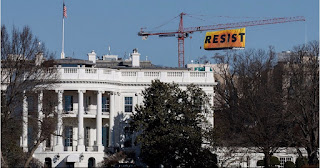Tweeting the Revolution
 |
| Greenpeace activists hang banner over White House |
I believe we are at war. This is not a war fought by soldiers and with bombs or tanks, but a war of words and images and data, some of it real, some of it faked. If you are active on social media right now, you are on the battlefield. If you've found yourself here on the battlefield without realizing war has broken out, it's time to wake up and pay attention.
All of us need to understand how the war is being fought. The tools that are being used to oppress us and suppress dissent are at your fingertips and can be used to fight back. It is no longer acceptable to deride Twitter as "silly" or a "waste of time," when our President can change relationships with countries in a single tweet.
In 2009, Iranian citizens demonstrated in the streets of Tehran against their government. This uprising was thought to be facilitated by Twitter and other social media, which was used by the protestors both to get the word out to the world about what was happening in their country and to stay connected to each other. This revolution is sometimes, then, referred to as the first Twitter Revolution as it initiated what has now been years of uprisings around the world, all facilitated by social media.
The uprising in Iran began after elections that year that were widely believed to be "rigged." The Iranian government literally shut down access to the internet during this time in an attempt to control the revolt. Two years later, the people of Egypt rose up against their own president, who they deemed to be corrupt. That revolution was, again, facilitated by social media. I wrote about it here and am struck by the similarities between what is happening in the US this month, in 2017, and what happened in Egypt in 2011.
What lessons, if any, can we draw from this history? In no particular order, here are some thoughts I've had as I've watched, generally through social media feeds, the last week or so of protests across our country.
- Don't use your social media feed to vent and rage impotently against the system or people you disagree with. This is not the best use of these platforms and only adds to the already deafening noise level on them. If you need to vent (and we all need to do this) use your own private journal or, better yet, talk to your friends and family in person.
- Do use social media to connect with others, share information, or organize action (protests, calling or letter-writing campaigns, meetings, etc). Social media are really just fast and highly-connected communication channels. Their greatest value lies in facilitating and enhancing our ability to communicate with each other.
- Stop fighting with each other. We need to unite to better fight our common enemy. There are many things at stake and all are important, but it serves no one to shame or chastise people who happen to be working on an issue different from the one you're passionate about.
- Limit your social media time and understand that too much Facebook time (or Twitter or even televised news) can be detrimental to your health. Our bodies are not designed to take in this much alarming information this quickly, so prioritize self-care at this time: maximize time spent in nature, get plenty of sleep and exercise and make time to connect (in person) with other people. Stay focused on your own life and work and use these media sparingly to stay informed and share useful information with others, not to substitute for a life in the real world.
- Understand that in this highly-connected world, things will evolve and change much more quickly than they did in the past. A coup that might have taken weeks or months to pull off can now occur overnight. A revolution that might have taken months or years to succeed might now prevail in a few weeks. This is simply a result of the increased speed of communication and not necessarily due to the fact that we are more nimble. It will make your head spin at times--we all need to get used to living in a new timescale.
There will be more opportunities to flex our social media skills, so let's get smart about how best to use these valuable tools. One of my current fears is that our government, like governments in the past, will try to cut off access to social media platforms, in an attempt to squash dissent. It's happened in the past in other countries and it could happen here. We need to be vigilant.
Comments
Post a Comment
Please leave a comment!